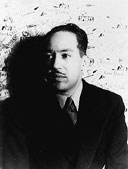| wiki | search |
Main Page | Groups and Assignments | Bios | History | Harlem | Diversity Today | Help
Famous for his poem The Negro Speaks of Rivers, Langston Hughes was an important figure in the literary aspect of the Harlem Renaissance. Born on February 1, 1902 in Joplin, Missouri, Langston Hughes led a sad childhood as a result of his parent's separation. During his early school years, Hughes was seen as an excellent writer, especially in poetry. Throughout the Harlem Renaissance, he attended Lincoln University, where he started his writing career. As a writer and a poet, the works of Langston Hughes focused on the black low and middle working classes.
These poems and writings, created with jazz rhythms and folk dialect, sought to inform the audience about the lives of the urban blacks. Their lives were not what everyone thought them to be. Instead these lives were filled with struggle from work, joy and laughter. Educating the audience about the reality behind the lives of blacks was a way to end the racial stereotypes that were present during this era. This would help many realize the true black identity.
Another aspect of Hughes was his establishment of racial consciousness in his works. This in turn inspired many other talented artists of the Harlem Renaissance. Hughes is named one of the founders of the Harlem Renaissance as his use of black pride became a widely accepted notion of this cultural movement. Not only did was he a black pride role model for those in Harlem, but those abroad as well. His works led to the Négritude movement in France, a movement similar to that of New York's Harlem Renaissance.
Major Works by Hughes during the Harlem Renaissance
The Weary Blues-1926
Not Without Laughter-1930
Mule Bone-1931
The Negro Artist and the Radical Mountain-1926

